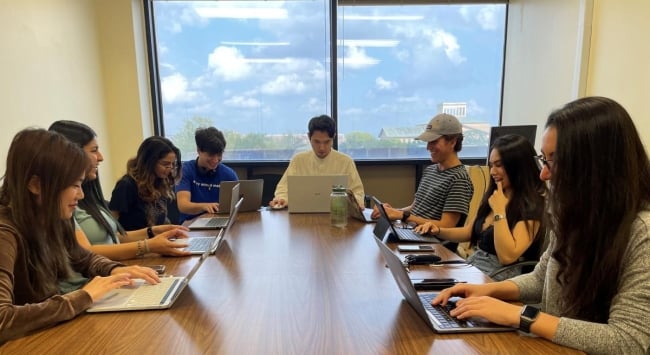You have /5 articles left.
Sign up for a free account or log in.

University of Houston students train as moderators for its Deliberation Testbed project.
Ryan Kennedy
You don’t have to spend much time on MSNBC or Fox—or even the congressional deliberations on C-SPAN, for that matter—to see that Americans’ collective ability to engage in civil discourse is in doubt. Colleges are not immune, as evidenced by speaker shutdowns and students’ own doubts about whether they can speak freely on campus.
It was with those concerns in mind that Ryan Kennedy, an associate professor of political science at the University of Houston, sought and received an institutional grant to create a co-curricular program with small group discussions, moderated by well-trained peers, about some of the most contentious issues facing society today.
“If we think that encouraging civil discourse and discourse across differences is important, then the way to do that is to actually put students in a situation where they experience it and where they’re able to realize that political discussion doesn’t have to be like what they see on cable news,” Kennedy said.
The Deliberation Testbed, a three-year-old initiative at the university, puts students in online group discussions of no more than 12 participants to exchange views on important issues facing the country such as foreign policy, immigration and health care. Students are focusing on social media regulation this semester.
The program has trained nearly two dozen undergraduate and graduate students to moderate discussions and act as mediators in case any inappropriate interactions take place. The forum features an online text-based format instead of face-to-face interaction, which can be uncomfortable for students with social anxiety. The text-based approach also tends to eliminate the gender gap in these discussions, because women tend to speak a lot more when men don’t have the opportunity to interrupt, Kennedy said.
“The experience has been quite challenging as a moderator, just because it requires you to be very proactive and very knowledgeable on the topics you’re discussing,” said Tochi Okoli, an undergraduate student moderator. “If at any point any of the discussions kind of run dry, it’s you that has to apply that kind of background knowledge to be able to spur them on to discuss more.”
Many universities, such as the University of Houston, require students to complete a course in American government in order to graduate. Often those classes involve hundreds of students, with discussions—commonly in the form of a debate—emphasizing “the idea of winning your own point” rather than engaging in a more deliberative back-and-forth, which can intimidate students, according to Kennedy.
Kennedy envisioned Deliberation Testbed as an alternative that would create room for students to speak freely in deliberative group discussions. The program uses a platform called Common Ground for Action, which was specially designed and developed by the National Issues Forum and the Kettering Foundation for this purpose. Students in Houston’s intro courses on Texas government and American government are required to participate in Deliberation Testbed.
The students also participate in an immediate postforum survey where they’re asked whether the program was informative and helpful and if these discussions are important for the health of democracy, alongside others. In the previous session, about 95 percent of students agreed or strongly agreed that the sessions were helpful and informative, and 99 percent said such discussions are important for the health of democracy. Kennedy said one of the more “shocking” results from the survey was how 71 percent of students said they would be interested in doing another forum on a different political topic even if it wasn’t required.
Some of the student moderators said the forums made a big impact on the participants because they encouraged them to engage in political discourse so they should be offered more widely across other institutions. It can be easy for college students to be unaware of the issues surrounding politics besides what they see on social media and to understand the way their decisions can have an influence, according to Okoli.
Spiridhon Hoxha, undergraduate student moderator for the program, said students who participate in the forums—even those who were skeptical at the start—report feeling like their opinions are heard and that they become more open-minded and understanding of others’ views.
“A lot of universities would benefit from having these sorts of discussions, especially since political polarization is something that is a very big problem in our society,” said Hoxha.
Ohio State University has a similar program, called the Shop Class for Democracy, that also uses the Common Ground for Action platform. The program, part of the university’s Institute for Democratic Engagement & Accountability, is led by Michael Neblo, a political science professor at Ohio State.
“We believe developing skills and experiences in productive dialogue across differences should be central to fulfilling the university’s motto—‘Education for Citizenship’—in a way suited to today’s hyperpolarized political climate,” Neblo said.
At the national level, the National Week of Deliberation strives to bring students together to engage in civil discourse across colleges and universities around the country. The event was founded five years ago by Kara Dillard at James Madison University, in Virginia, and Kara Lindaman at Winona State University, in Minnesota. It takes place each spring through the Common Ground for Action platform across political, cultural and geographic divides where students discuss critical issues such as guns and safety, and policing and racial violence, according to Dillard.
Dillard said participants come from institutions that range from rural and conservative to urban and liberal, and this allows them to see past the “hyperpolarized, politically charged” news media environment.
Programs like these touch only a relative few students at their respective colleges, but they can create a “spark” that can affect change in their local communities, Dillard said.
She added, “The Deliberation Testbed, the Shop Class and the National Week of Deliberation are all really good examples of high-quality deliberation that can teach students civic engagement skills that can change their life.”




